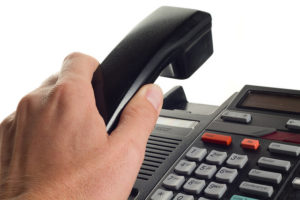Written by: Greg Ellifritz
I’ve updated and reposted this article because I responded to another scam just like the one listed below last week. The elderly man was scammed out of $3600. I updated the post with the details of the latest scam going around. Read about how these scams work and make sure your elderly relatives understand how to prevent them.
– Greg
Let me tell you about a call I went on at work last week. The victim was successfully scammed out of $1500 in a half-hour time period. Would you fall victim to a similar scam?
Imagine getting a phone call in the early afternoon. The voice on the other end of the phone sounds vaguely familiar, but you’re not sure who it is. The voice says:
“I bet you can’t guess who this is.”
Do you play the game? How many of you have received similar calls from prankster friends? How would you answer? Would you guess?
The elderly female victim in my case thought it might be her grandson playing a joke. She said: “I know who it is. It’s Seth (the name of the victim’s grandson).”
The person on the other end of the phone quickly replied: “You’re right! It’s Seth. I just sound a little different because I have a cold.”
The victim now believed she was talking to her grandson. “Seth” says: “I’m sorry to bother you, but I’m in a lot of trouble. I got arrested in Florida and I need some bail money to get out of jail. Wait a second and I’ll put on the police officer and he’ll give you all the details.”
The phone is handed off and another man’s voice came on the line:
“Mrs. xxxx, this is Officer xxxx with the xxxx City Police Department. Seth was arrested for possession of more than two pounds of marijuana. He’s been calling his friends all morning trying to raise money to get out of jail, but he’s been unsuccessful so far. This is the last phone call we are allowed to provide him. He was hoping you would be able to come up with $1500 so that he doesn’t have to spend the next three months in jail awaiting trial.”
The friendly police officer then described how she could “bail her grandson out of jail.” He instructed her to go to a local drug store and buy $1500 in untraceable Green Dot Money cards. These cards are like pre-paid credit cards, but no identification is required to buy them. Each card has a number. If you know the number, you can withdraw the cash on the card at any location where the cards are sold. It’s a common way that criminals and drug smugglers transfer money anonymously, especially across international borders.
The victim in my case went to the drug store and purchased $1500 worth of these green dot cards and then called the “police officer” back and gave him the numbers so he could withdraw the cash.
She didn’t think anything about it until the “police officer” called back about an hour later and asked her to send another $1500! She got suspicious and did an internet search on the “police officer’s” telephone number. She found that the number originated in Canada and had been reported in connection with dozens of telephone scams.
The $1500 was gone. My victim was scammed by professionals. They used the relatively innocuous challenge of “I bet you can’t guess who this is” to elicit just a single piece of information…the name of a close friend, relative, or associate. The scammers then preyed on the woman’s concern for her grandson’s well being and swindled her out of a significant quantity of cash.
I’ve seen reports of this scam at least four additional times this year. Often the scammers are physically located in Mexico. When you look at your caller ID, you see a Mexican city. When that happens, your “grandson” will have been arrested in Mexico on a false drug smuggling charge and will need money to pay off the corrupt cops. The “corrupt Mexican cops” get their money from the same Green Dot moneypack cards.
You should be suspicious of any phone call asking ANY type of personal information unless you actually know the caller. Even the most seemingly innocuous piece of information can be used against you by these professional scam artists. Don’t play the game.
You should also be suspicious of anyone who talks about using untraceable methods to transfer money. No courts in the world request bail money in untraceable pre-paid cash cards. Most courts can place bail money on a regular credit card or will accept cash. They don’t take Green Dot. If anyone asks you for a Green Dot number, you are likely being scammed.
I know you are thinking, “That could never happen to me.” The victim in my case thought the same thing. It can’t ever happen…until it does. Be smart. Don’t give personal information to people you don’t know.
Here’s another version of the same scam that I responded to recently. The phone rings.
“Grandpa. It’s your grandson!”
“Steve? You don’t sound like yourself.”
“Yes, it’s Steve. I’m sorry. I have a sore throat. That’s why my voice is so scratchy. Grandpa, I’m in trouble. I got in a car wreck down in Houston. I got arrested because I had been drinking a couple of beers before the crash. I have a court appointed attorney. Will you talk to him?”
Of course!
“Attorney” gets on phone.
“Mr. xxx, your grandson crashed into another person’s car. Unless he’s willing to pay for the damages on that person’s car, he’s going to be put in jail. The person he’s hit is from another country and is driving a rental car. He’s leaving the country this afternoon and doesn’t have time to allow this case to be settled by insurance.
In order to keep your grandson out of jail, you’ll need to send $3600 via Western Union to xxxx xxxxxxx in Beruit, Lebanon.”
The 90 year old grandfather followed the instructions perfectly. When he got home after wiring the money, he called his daughter and found that his high-school age grandson was at football practice and hadn’t been in any type of car crash.
In order to prevent such scams, institute a “code word” practice between you and all of your family members. If you get a call from a family member requesting any type of money, ask for the code word. If the person on the other end of the phone can’t provide it, then you are talking to a scam artist and not your relative. No code. No money. No exceptions.
Frank Abagnale, author of Scam Me if you Can has studied hundreds of scams like this. Every single scam had one of two possible identifying characteristics:
1) Immediate Requests For Money- The money has to be paid NOW. The scammers will request credit card numbers, gift cards, or pre-paid money cards.
2) Request for personal information- The scammers will ask details about name, address, phone numbers, family member names, bank account numbers, dates of birth, or social security numbers.
Requesting immediate payment of money or requesting personal information of any kind should be your red flag alert that the call you have taken is a scam. Hang up immediately.
Sometimes your “Tactical Scenario” involves something other than a back alley gunfight or home invasion. Some robbers can steal your money without ever pulling a gun. Stay sharp.
Some of the above links (from Amazon.com) are affiliate links. As an Amazon associate I earn a small percentage of the sale price from qualifying purchases.


